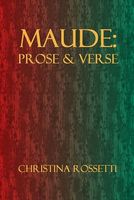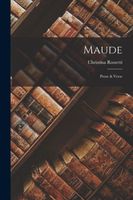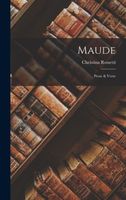- Welcome to FictionDB, Guest
- | My Account
- | Help

Maude — Christina Georgina Rossetti
A prose tale interspersed with poems from one of the finest spirits in English meditative poetry. An attempt on Miss Rossetti's part, to exhibit in fiction what she regarded as defects in her own character.
-"Book News," Volume 15 * * * * * * *
Prefatory Note
THIS "Tale for Girls" (as I should be disposed to call it) was written out by Christina Rossetti, with her usual excessive neatness of calligraphy, in 1850. I suppose it may have been composed in that year, or a year or two earlier. In 1850, up to the 5th December, she was nineteen years of age. Of the rather numerous poems interspersed in the tale, all save two have, I think, been published ere now. They were all written without any intention of inserting them in any tale-except only the first two in the trio bouts-rimes sonnets. The MS. of the tale presents a few slight revisions, made at some much later date-perhaps about 1870, or 1875.
I daresay that Christina may, towards 1850, have offered the tale here or there for publication, but have no particular recollection as to that point. In now at last publishing it, I am not under any misapprehension regarding the degree of merit which it possesses. I allow it to be in all senses a juvenile performance; but I think it is agreeably written, and not without touches of genuine perception and discernment. Most of the poems I rate high. The literary reputation of Christina Rossetti is now sufficiently established to make what she wrote interesting to many persons-if not for the writing's own sake, then for the writer's. As such, I feel no qualms in giving publicity to Maude
. It appears to me that my sister's main object in delineating Maude was to exhibit what she regarded as defects in her own character, and in her attitude towards her social circle and her religious obligations. Maude's constantly weak health is also susceptible of a personal reference, no doubt intentional: even so minor a point as her designing the pattern of a sofa-pillow might apply to Christina herself. Maude is made the subject of many unfavourable comments, from herself and from her strict-minded authoress. The worst harm she appears to have done is, that when she had written a good poem, she felt it to be good. She was also guilty of the grave sin of preferring to forego the receiving of the eucharist when she supposed herself to be unworthy of it; and further, of attending the musical services at St. Andrew's Church (Wells Street, Oxford Street), instead of invariably frequenting her parish church. If some readers opine that all this shows Christina Rossetti's mind to have been at that date overburdened with conscientious scruples of an extreme and even a wire-drawn kind, I share their opinion. One can trace in this tale that she was already an adherent of the advanced High Church party in the Anglican communion, including conventual sisterhoods. So far as my own views of right and wrong go, I cannot see that the much-reprehended Maude commits a single serious fault from title-page to finis.
I fancy that Agnes and Mary Clifton may be, to some extent, limned from two young ladies, Alicia and Priscilla Townsend, whom my sister knew and liked in those years. The whole family emigrated-perhaps a year or two prior to 1850- to Canterbury Settlement, New Zealand. Some surnames introduced into the tale-such as Hunt, Deverall, and Potter-were highly familiar in our household. Towards the close is a sentence, "The locked book she never opened, but had it placed in Maude's coffin "; which is curious, as an unconscious pre-figurement of a well-known and much-discussed incident in the life of Dante Gabriel Rossetti.
With these few remarks I commit Maude to the reader. For its prose the "indulgent reader" (as our great-grandfathers used to phrase it) may be in requisition; for its verse the "discreet" reader will suffice.
-W. M. Rossetti
-"Book News," Volume 15 * * * * * * *
Prefatory Note
THIS "Tale for Girls" (as I should be disposed to call it) was written out by Christina Rossetti, with her usual excessive neatness of calligraphy, in 1850. I suppose it may have been composed in that year, or a year or two earlier. In 1850, up to the 5th December, she was nineteen years of age. Of the rather numerous poems interspersed in the tale, all save two have, I think, been published ere now. They were all written without any intention of inserting them in any tale-except only the first two in the trio bouts-rimes sonnets. The MS. of the tale presents a few slight revisions, made at some much later date-perhaps about 1870, or 1875.
I daresay that Christina may, towards 1850, have offered the tale here or there for publication, but have no particular recollection as to that point. In now at last publishing it, I am not under any misapprehension regarding the degree of merit which it possesses. I allow it to be in all senses a juvenile performance; but I think it is agreeably written, and not without touches of genuine perception and discernment. Most of the poems I rate high. The literary reputation of Christina Rossetti is now sufficiently established to make what she wrote interesting to many persons-if not for the writing's own sake, then for the writer's. As such, I feel no qualms in giving publicity to Maude
. It appears to me that my sister's main object in delineating Maude was to exhibit what she regarded as defects in her own character, and in her attitude towards her social circle and her religious obligations. Maude's constantly weak health is also susceptible of a personal reference, no doubt intentional: even so minor a point as her designing the pattern of a sofa-pillow might apply to Christina herself. Maude is made the subject of many unfavourable comments, from herself and from her strict-minded authoress. The worst harm she appears to have done is, that when she had written a good poem, she felt it to be good. She was also guilty of the grave sin of preferring to forego the receiving of the eucharist when she supposed herself to be unworthy of it; and further, of attending the musical services at St. Andrew's Church (Wells Street, Oxford Street), instead of invariably frequenting her parish church. If some readers opine that all this shows Christina Rossetti's mind to have been at that date overburdened with conscientious scruples of an extreme and even a wire-drawn kind, I share their opinion. One can trace in this tale that she was already an adherent of the advanced High Church party in the Anglican communion, including conventual sisterhoods. So far as my own views of right and wrong go, I cannot see that the much-reprehended Maude commits a single serious fault from title-page to finis.
I fancy that Agnes and Mary Clifton may be, to some extent, limned from two young ladies, Alicia and Priscilla Townsend, whom my sister knew and liked in those years. The whole family emigrated-perhaps a year or two prior to 1850- to Canterbury Settlement, New Zealand. Some surnames introduced into the tale-such as Hunt, Deverall, and Potter-were highly familiar in our household. Towards the close is a sentence, "The locked book she never opened, but had it placed in Maude's coffin "; which is curious, as an unconscious pre-figurement of a well-known and much-discussed incident in the life of Dante Gabriel Rossetti.
With these few remarks I commit Maude to the reader. For its prose the "indulgent reader" (as our great-grandfathers used to phrase it) may be in requisition; for its verse the "discreet" reader will suffice.
-W. M. Rossetti
Genres
Themes
Click on any of the links above to see more books like this one.



